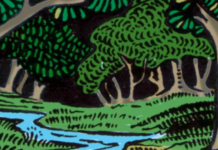
The Book of Wizardry: The Apprentice’s Guide to the Secrets of the Wizards’ Guild
, by Cornelius Rumstuckle
Llewellyn Worldwide, 0738701653, 325 pp., 2003
This book presents it self somewhat confusingly. On the back of the book the category indicates it as fiction, yet inside it describes itself as ‘positively not fiction’. It might be more accurate to say it’s a bit of both. As it is, the book is comprised of two parts, the first deals mostly with magickal theory and simple exercises (mostly non-fiction), the second a game (fiction, though it repeatedly claims not to be).
The first part includes twenty-two short sections on magickal topics with practical exercises describing how to make simple tools and use them with simple techniques – and as an added bonus, he manages to do this without including any religious elements that usually pervade introductory books of this sort. The practical exercises given are generally quite good, and will prove useful to the budding trainee wizard.
However, Rumstuckle’s advice regarding ritual tools is somewhat shaky. He sensibly substitutes a feathered wand for a knife or dagger – rather dangerous weapons in the hands of a minor. Yet his advice regarding making a wand out of cardboard that I find most bizarre – if you’re going to go to the trouble of having ritual tools, make them of substantial quality – eight year old or not, use a real stick. I’m not sure how serious anyone would feel waving around a cardboard roll.
The exercises given for charging and purifying aren’t bad, but there is a ridiculous sense of dependence on the tools, indeed he states that any elemental ritual cannot be done without them – in my experience, I have not found this to be the case.
The second part of the book is written in a ‘choose your own adventure’ style game where you use the practical advice and lessons taught in the previous twenty-one chapters to arrive at a coded message, instructing you to mail and request further lessons.
While the practical section is quite good, I’m not impressed with the fabricated history surrounding the lessons and the author – the exercises can stand alone without it. Indeed, much of the information contained within resonates with popular occult theory, and tables of correspondence are taken from such sources as Eliphas Levi and actual recognized occult authors. I understand that falsifying is supposed to add to the mystique and it’s supposed to be a clever marketing tool cashing in on the Harry Potter craze, but it takes away from the true validity and practicality of the book, which is a shame.
It’s not a terrible introduction to the basics of the magickal arts for the group its aimed at, but it’s not the best it could have been either. ‘Rumstuckle’s’ falsification of history and lineage and his insistence on its importance makes this book simply sound phoney – had the information been presented in a more honest manner it might have been more suitable for recommendation, as it is, I’m sorry to say I don’t find it to be so.








